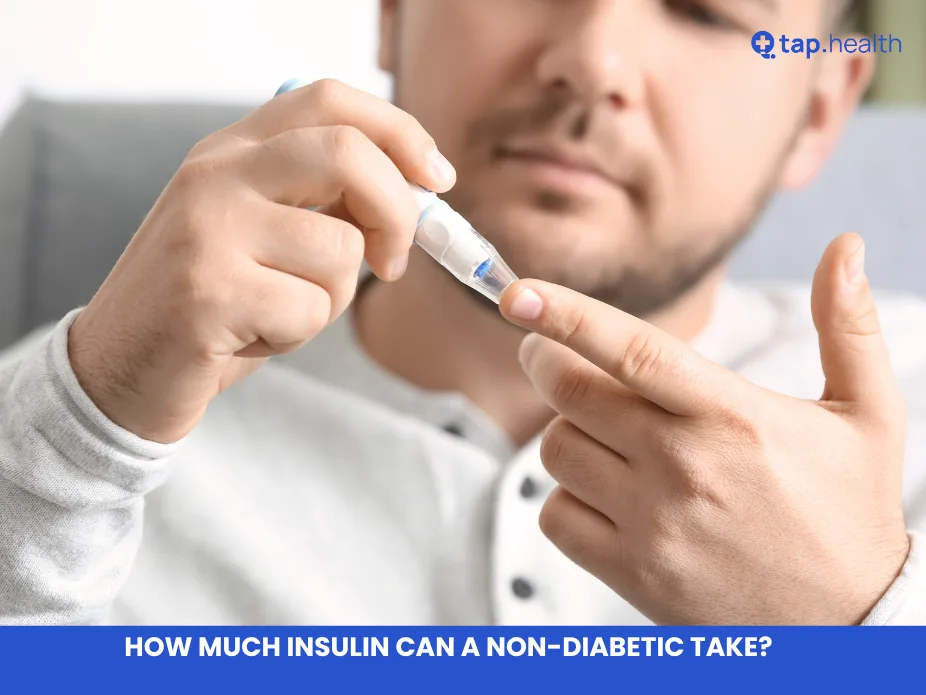You feel a tender, pea-sized bump under your jawline or on the side of your neck. You press it gently, and it moves slightly. Your mind starts racing. Is it a sign of something serious? And if you’re living with diabetes, a new question pops into your head: could my diabetes be causing this?
It’s a scary and confusing moment. Your lymph nodes are part of your body’s defense system, and when they swell, it’s usually a sign they’re fighting something off. But where does diabetes fit into all of this?
The short and direct answer is: Diabetes does not typically cause swollen lymph nodes in the neck by itself. However, diabetes can create conditions in your body that make you much more likely to get sick from the infections that do cause lymph nodes to swell.
Think of it this way: diabetes doesn’t start the fire, but it can remove the fire alarms and sprinklers, allowing a small spark to become a much bigger blaze.
This article will break down this connection in simple, easy-to-understand terms. We’ll explore how diabetes affects your body’s defenses, the real reasons your lymph nodes might be swollen, and the most important thing you can do: know when to see a doctor.
What Are Lymph Nodes and Why Do They Swell?
First, let’s talk about what we’re actually dealing with. Lymph nodes are tiny, bean-shaped glands that are part of your immune system. You have hundreds of them throughout your body, but the ones you can feel are located in your neck, under your arms, and in your groin area.
Their job is to act as filtering stations. They trap viruses, bacteria, and other unwanted invaders (what doctors call “pathogens”) and are full of immune cells that work to destroy these threats.
When you have an infection or inflammation nearby, the lymph nodes in that area spring into action. They produce more immune cells to fight the enemy, which causes them to become enlarged and often tender. This swelling is a sign that your body is doing its job. Doctors call this condition lymphadenopathy.
Can Diabetes Cause Swollen Lymph Nodes in Neck?
Diabetes by itself does not directly cause swollen lymph nodes in the neck. However, people with diabetes are more prone to infections and inflammation, which are the most common reasons lymph nodes swell.
Common reasons for swollen lymph nodes in the neck include:
- Common illnesses: Colds, flu, strep throat, and ear infections.
- Skin conditions: Infected acne, cuts, or scrapes on the scalp or face.
- Dental issues: Tooth abscesses or gum disease.
- Other infections: Mononucleosis (mono), tonsillitis, or skin infections.
In most cases, the swelling goes down as you recover from the illness.
The Direct Link: Does Diabetes Itself Cause the Swelling?
Let’s answer the core question head-on. There is no known biological mechanism where high blood sugar directly causes a lymph node to swell. The swelling is not a symptom of high blood sugar in the way that increased thirst or frequent urination is.
Diabetes is a metabolic disorder that affects how your body processes sugar (glucose). Lymph node swelling is an immune system response. They are two different systems in the body.
So, if you have swollen lymph nodes and diabetes, the diabetes is likely not the direct cause. Instead, it’s often a critical contributing factor to the underlying cause, which is usually an infection.
The Indirect Link: How Diabetes Paves the Way for Infections
This is where the real connection lies. Poorly managed diabetes, meaning consistently high blood sugar levels, can seriously weaken your body’s natural defenses. This happens in a few key ways:
1. Weakened Immune System (Immunosuppression)
High blood sugar levels can cripple your immune system’s ability to function properly.
- White Blood Cell Dysfunction: White blood cells are your body’s soldiers. They are responsible for finding and destroying harmful bacteria and viruses. However, when swimming in a high-sugar environment, these soldiers become sluggish and ineffective. They have a harder time getting to the site of an infection, and they are less efficient at killing the germs they find.
- Reduced Blood Flow: Over time, high blood sugar can damage your blood vessels, both large and small. This damage reduces blood flow, especially to the extremities. Poor circulation means fewer immune cells and healing factors can reach a cut or a developing infection to stop it early. A small nick while shaving or a minor gum injury can become a serious problem because the “reinforcements” can’t get there fast enough.
2. Higher Risk of Infections
Because your immune system is weakened, you are far more susceptible to all kinds of infections. For the lymph nodes in your neck, the most relevant infections are:
- Skin and Soft Tissue Infections: Cuts, scrapes, or even ingrown hairs on your face, scalp, or neck can become infected more easily. The lymph nodes in your neck will swell as they try to fight this local infection.
- Frequent Colds and Respiratory Illnesses: A weakened immune system makes you an easier target for every cold and flu virus that goes around.
- Thrush and Oral Infections: High blood sugar provides a sweet food source for yeast and bacteria in your mouth. This can lead to oral thrush (a yeast infection causing white patches) and more severe gum disease (periodontitis). These oral infections are a very common cause of swollen lymph nodes in the neck and under the jaw.
3. Chronic Inflammation
Diabetes is considered a pro-inflammatory state. This means that even without an active infection, your body may be in a constant state of low-grade inflammation. While this systemic inflammation doesn’t typically cause significant lymph node swelling on its own, it creates a background of chaos that makes it harder for your body to respond effectively to a real threat, potentially making any subsequent infection worse.
Other Diabetes-Related Causes of Swollen Lymph Nodes
Beyond infections, there are a couple of other scenarios where diabetes and swollen nodes might be connected.
Reactions to Diabetes Medications
In very rare cases, certain medications can cause a reaction that includes swollen lymph nodes. This is a type of drug hypersensitivity. It is not common, but it is a possibility your doctor will consider, especially if you’ve recently started a new medication. Never stop taking a prescribed medication without talking to your doctor first.
Associated Autoimmune Conditions
People with Type 1 diabetes, an autoimmune disease itself, are at a slightly higher risk of developing other autoimmune disorders. Some of these, like lupus or rheumatoid arthritis, can cause generalized lymph node swelling as a symptom. This is less about the diabetes and more about a related condition.
What Else Could It Be? Common Non-Diabetes Causes
It is crucial to remember that your swollen lymph node could be completely unrelated to your diabetes. It’s important not to jump to conclusions. Other extremely common causes include:
- Ubiquitous Viral Infections: The common cold, influenza, and mononucleosis are among the top causes.
- Bacterial Infections: Strep throat, an infected tooth, or an ear infection are classic culprits.
- Non-Serious Causes: Even a canker sore or a significant zit can cause a nearby node to swell temporarily.
- Less Common but Serious Causes: In some cases, persistent swollen lymph nodes can be a sign of certain types of cancer, such as lymphoma or leukemia, or an immune system disease like HIV. This is why persistent swelling must be checked by a doctor.
When Should You Be Worried? The Red Flags
A swollen lymph node is usually not a cause for panic. However, you should see a doctor as soon as possible if you notice any of the following “red flag” symptoms:
- The node is larger than one centimeter (about the size of a pea).
- The swelling persists for more than two weeks.
- The node feels very hard, rubbery, or fixed in place (doesn’t move when you push it).
- The swelling is getting progressively worse over time.
- You have a fever, drenching night sweats, or unexplained weight loss.
- You have no other signs of a cold or infection.
- The node is not tender or painful. (Paradoxically, tender nodes often point to a reactive cause like infection, while painless, hard nodes can be more concerning.)
- You have swollen nodes in multiple locations (e.g., neck, armpits, and groin).
What Will a Doctor Do? The Diagnostic Process
If you see a doctor for a swollen lymph node, they will follow a logical process to figure out the cause.
- Medical History: They will ask about your symptoms, how long the node has been swollen, if you’ve been sick recently, and about your diabetes management (including your recent blood sugar levels and A1C).
- Physical Examination: They will feel the node’s size, texture, tenderness, and mobility. They will also check your throat, ears, and skin for any signs of infection.
- Blood Tests: They might order tests to check your white blood cell count (a sign of infection), and for specific viruses like mononucleosis.
- Imaging: In some cases, an ultrasound of the neck might be used to get a better look at the node.
- Antibiotics: If a bacterial infection is suspected, they may prescribe a course of antibiotics to see if the swelling goes down.
- Biopsy: If the swelling is persistent and the cause remains unknown, the doctor might recommend a biopsy. This is a minor procedure where a small piece of tissue is removed from the lymph node and sent to a lab for analysis. A biopsy is the only way to rule out or confirm cancer definitively.
The Best Treatment is Prevention: Managing Your Diabetes
The most powerful thing you can do to prevent infections that lead to swollen lymph nodes is to manage your diabetes effectively.
- Tight Glycemic Control: Keeping your blood sugar levels within your target range is the number one strategy. A well-managed blood sugar level allows your immune cells to function at their best.
- Prioritize Oral Hygiene: Brush and floss regularly and see your dentist every six months. Preventing gum disease is a direct way to prevent a common cause of neck node swelling.
- Practice Good Skin Care: Treat any cut, scrape, or bug bite immediately. Clean it with soap and water, apply antibiotic ointment, and keep it covered until healed.
- Get Vaccinated: Stay up to date on your flu shot, pneumonia vaccine, and COVID-19 vaccines. Vaccination gives your immune system a head start in fighting off these specific illnesses.
- Wash Your Hands: Simple, but incredibly effective at preventing the spread of germs.
Real-Life Scenario: John’s Story
John, a 55-year-old with Type 2 diabetes, noticed a small, tender lump on the right side of his neck. His blood sugar had been running higher than usual for the past few weeks. He felt a little tired but otherwise okay.
He saw his doctor, who asked about recent health issues. John remembered a small cut on his scalp from a week ago that seemed a bit red. The doctor examined the cut and confirmed it was mildly infected. The lymph node was swollen because it was fighting that exact infection.
Because of John’s diabetes, his body was having a harder time dealing with this minor skin infection. The doctor cleaned the wound, prescribed a topical antibiotic, and stressed the importance of getting John’s blood sugar back under control to help his body heal. Within a week of better diabetes management and the antibiotic, the cut healed and the lymph node returned to its normal size.
Expert Contribution: An Endocrinologist’s Insight
We spoke with Dr. Elena Rodriguez, an endocrinologist with over 15 years of experience, to get a specialist’s view.
“In my practice, I often see patients who are concerned about new symptoms and immediately link them to their diabetes. With swollen lymph nodes, my first thought is always to look for an underlying infection. The question isn’t, ‘Did diabetes cause this node to swell?’ but rather, ‘Is diabetes making it harder for my patient to fight off the infection that’s causing this swelling?’ This shifts the focus to what matters most: investigating the source of the infection and reviewing the patient’s glycemic control. A persistently high A1C is often the common thread in patients who experience frequent infections and subsequent lymph node swelling.”
Recommendations Grounded in Proven Research and Facts
The link between diabetes and infection risk is not just theoretical; it’s well-documented in medical literature.
- The CDC and ADA: Both the Centers for Disease Control and Prevention (CDC) and the American Diabetes Association (ADA) explicitly list people with diabetes as being at higher risk for infections of the skin, gums, and respiratory tract due to impaired immune function and poor circulation.
- Glycemic Control is Key: A study published in the journal Diabetes Care found that patients with higher A1C levels had a significantly increased risk of hospitalization for infections compared to those with better control. This solidifies the recommendation that managing blood sugar is the primary defense.
- Preventive Care Guidelines: Clinical guidelines strongly recommend that people with diabetes receive preventive care, including annual flu shots and regular dental check-ups, as standard practice to reduce infection risk. This is a direct, research-backed response to the known vulnerability.
Real-Life Scenario: Maria’s Story
To understand how this all comes together, let’s consider a real-life example. Meet Maria, a 58-year-old teacher diagnosed with Type 2 diabetes ten years ago.
For years, Maria’s blood sugar control was inconsistent. She’d watch her diet for a few months, then slip back into old habits. Her last A1C was 8.5%, higher than her target of 7.0%. Recently, she started noticing a constant, high-pitched ringing in both ears, especially when she was grading papers in her quiet living room at night. It was distracting and made it hard to focus.
She also found herself asking her students to repeat themselves more often and turning up the volume on her television. She initially blamed it on “just getting older.” But when the ringing became too persistent to ignore, she mentioned it to her endocrinologist during her regular appointment.
Her doctor explained the link between her prolonged periods of high blood sugar and the potential damage to the tiny vessels and nerves in her ears. He referred her to an audiologist, who confirmed a mild high-frequency hearing loss, consistent with diabetic-related damage.
This was the wake-up call Maria needed. She started working closely with a diabetes educator to revamp her diet and began a daily walking routine. She focused intensely on keeping her blood sugar within her target range. After a few months, her A1C dropped to 7.2%. While the tinnitus didn’t completely disappear, it became much less noticeable. Combined with a white noise machine at night and a new focus on stress management, Maria felt back in control. Her story shows that while the damage might not be fully reversible, proactive management can significantly improve your quality of life.
Expert Contribution: An Audiologist’s Perspective
We reached out to Dr. Sarah Jenkins, an audiologist with over 15 years of experience working with patients with chronic conditions like diabetes, to provide her professional insight.
“Many of my patients are surprised when I ask about their blood sugar levels and diabetes status,” says Dr. Jenkins. “The connection is not yet common knowledge, but it’s incredibly important. From my clinical perspective, I see a clear pattern: patients with poorly managed diabetes often present with a specific type of bilateral (both ears), sensorineural hearing loss that progresses faster than what we see in age-related hearing loss alone. The accompanying tinnitus is often a significant complaint.”
Dr. Jenkins emphasizes the importance of a holistic approach. “My role isn’t just to test hearing. It’s to connect the dots for the patient. I often tell them, ‘What’s good for your diabetes is good for your ears.’ Managing blood sugar, cardiovascular health, and stress isn’t just a note from their primary doctor; it’s a direct prescription for hearing health. The most successful patients are those who see their diabetes team and hearing specialist as one united front. Early intervention is key—don’t wait until the hearing loss is severe. If you have diabetes and notice any changes, get a baseline hearing test. It gives us a crucial point of comparison for the future.”
Recommendations Grounded in Proven Research and Facts
The advice surrounding diabetes and tinnitus isn’t just anecdotal; it’s supported by scientific studies and major health institutions. Here’s a breakdown of the research-backed recommendations:
- The Power of Glycemic Control: A large study published in the Annals of Internal Medicine found that participants with diabetes were more than twice as likely to have hearing impairment as those without. The study concluded that poor glycemic control over time was a significant risk factor. The recommendation is clear: achieving and maintaining a target A1C level (usually below 7% for most adults, as per the American Diabetes Association) is the single most effective strategy to prevent and slow the progression of hearing damage.
- The Heart-Ear Connection: The National Institute on Deafness and Other Communication Disorders (NIDCD) states that conditions that affect blood flow, such as diabetes and hypertension, can directly impact hearing. Their research recommends managing cardiovascular health as a primary method of protecting your ears. This means regular monitoring of blood pressure and cholesterol, and adhering to medication and lifestyle changes to keep them in a healthy range.
- Noise Protection is Non-Negotiable: Research from the Centers for Disease Control and Prevention (CDC) shows that people with diabetes are more susceptible to noise-induced hearing damage. Their fact-based recommendation is that individuals with diabetes must be extra vigilant about protecting their ears from loud environments. Using custom-fitted or over-the-counter ear protection in noisy settings is not just advised; it is considered a critical preventive measure.
- Evidence for Sound Therapy: Cognitive behavioral therapy (CBT) and sound therapy are among the most researched and recommended management techniques for tinnitus by organizations like the American Tinnitus Association. Studies show that using sound generators or hearing aids with masking features can significantly reduce the perceived burden and annoyance of tinnitus, improving daily functioning and sleep.
FAQ: Can Diabetes Cause Swollen Lymph Nodes in Neck?
Q1: Can high blood sugar alone cause swollen lymph nodes?
No, high blood sugar itself does not directly cause lymph nodes to swell. The swelling is a result of your immune system fighting an infection or other invaders. However, high blood sugar weakens your immune system, making you much more likely to get the infections that cause the swelling.
Q2: Can diabetic neuropathy cause swelling in the neck?
No, diabetic neuropathy refers to nerve damage, typically in the hands and feet. It does not cause swelling of the lymph nodes. Swollen glands are related to the immune and lymphatic systems, not the nervous system.
Q3: How long do swollen lymph nodes usually last?
When related to a common infection like a cold, lymph nodes should return to their normal size within a couple of weeks after the infection clears. If a node remains swollen for more than two to four weeks with no clear cause, it’s time to see a doctor.
Q4: Are there specific infections that people with diabetes are more prone to that affect the neck?
Yes. People with poorly controlled diabetes are more susceptible to skin infections (cellulitis, boils) on the head and neck, severe gum disease (periodontitis), and fungal infections like oral thrush. All of these can easily lead to swollen lymph nodes in the neck.
Q5: Should I be worried about cancer if I have diabetes and a swollen lymph node?
While it’s a common fear, most swollen lymph nodes are not caused by cancer. The overwhelming majority are due to infection. However, because both diabetes and cancer are serious health issues, it is essential to get any persistent, unexplained swelling checked by a doctor to rule out serious causes and give you peace of mind.
Q6: What can I do at home for a swollen lymph node?
If the node is tender and you suspect a minor infection, you can apply a warm compress to the area to help soothe discomfort. The most important “at-home” treatment, however, is to focus on getting your blood sugar levels under control to empower your body to fight off the infection effectively.
Q7: Can a lymph node swell from high stress, and does diabetes play a role?
Stress can weaken the immune system temporarily, potentially making you more susceptible to the infections that cause swollen nodes. Since managing diabetes can be stressful, this can create an indirect cycle. Learning stress-management techniques is beneficial for both your diabetes control and your overall immune health.
Final Thoughts
Finding a swollen lymph node can be alarming, but knowledge is your best tool. Remember, diabetes is not the direct villain here. Instead, it’s the condition that can weaken your body’s guards, allowing infections to sneak in and cause trouble.
Your number one goal is to be the best commander for your body’s army. You do that by managing your blood sugar, practicing excellent hygiene, and listening to what your body is telling you. Don’t ignore a swollen lymph node, especially if it sticks around. See your doctor, get it checked out, and use it as a potential motivator to tighten up your diabetes management. Your health is worth it.



